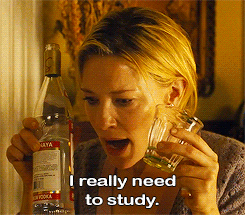Sleep is more important than food. You can go a week without eating and the only thing you'll lose is weight. Give up sleep for even a couple of days and you'll become completely dysfunctional. Even so, we're all too willing to trade away an hour of sleep for the false belief that it will give us one more hour of productivity. In fact, even very small amounts of sleep deprivation take a toll on our cognitive capacity. The notion that some of us perform adequately with very little sleep is largely a myth.
—Tony Schwartz

I remember the first late night I ever had in college. It was a introductory art course in my very first term. I was working on a conceptual drawing that I wasn’t proud of and that I knew wouldn't turn out well (it didn’t). I didn’t even make it past 2:30 am before I started crying—hard. I couldn’t fathom working any harder than I was already working. Yet it was only a laughable preview of the life of a graphic design student…
By the time I got to my junior year, it was common for myself and others to only get about two or three hours of sleep per night. I wouldn’t ever admit to myself that I hated staying up late because I thought that's what it took in order to be good. I felt if I wasn't staying up late like everyone else, then I must not be working hard enough.


This is a very difficult topic. It's sort of a cliché that being in college means staying up late, working all day, being super hardcore and not feeling anything. Some people thrive creatively that way and love working late at night because they feel that’s when they have the most time to themselves. I think you should do whatever’s best for you.
As a student, there will be some late nights. It’s unrealistic to try to avoid them all. But equally unrealistic is pushing yourself too hard and thinking that your body somehow doesn’t need the horizontal requirements that other human beings do.
I remember a prominent graphic designer once talk about his work schedule. He loved what he did despite the fact that he worked 18 hour days starting at 9 am, working until 3am, and then sleeping until 9am when he would do it all over again the next day. His routine scared me to DEATH. It had me thinking, If this is really what it takes to be successful in this field, I’m out.
I’ve been there...only I need about 3-5 days of recovery afterward. When you don’t allow yourself enough sleep, you start to compromise the quality of your work time.1 It's not about working harder, but smarter.
On the flipside, consider the routine of London-based artist and designer Daniel Eatock, who claims he spends about 20 minutes a day on his design work. Just let that sink in for a second...
I have finally learned how to go to sleep after being in school for nearly 6 years. I am currently writing this as a senior and so far this year I haven’t worked past 1:30 in the morning—which, for me, is a huge personal success. I've decided to plan my work schedule according to how I work best. When I stay up late, I become unhappy and stressed out. My sleep schedule gets all out of sync and it gets harder and harder to stay on top of things—forcing me to stay up later and later—thus perpetuating the vicious cycle.
If you’re tired and you want to go to sleep, your project is not going to suffer for it. I’d always rather go to bed now and get up early tomorrow. I’m much fresher (and happier) after I’ve had the chance to completely wind down.2
You know it’s time for bed when...It’s late, you’re tired, you start to slow down, you can’t focus, you’ve been working all day, and/or you’ve reached a good place to stop. Adrian Shaughnessy talks about ending on a high note:
We should always avoid ending any interim stage of a project on a low note. When struggling with a task we are often tempted to abandon it, telling ourselves that we’ll attack the problem tomorrow with renewed vigor. This occasionally works. It clears the mind and allows us to start afresh. But more usually it means that we restart the project with a lack of enthusiasm, and find distractions and reasons for doing other things. If, on the other hand, we abandon a project on a high note, then we find that we are keen to get back to work—which means that we don’t waste time prevaricating.
I love this advice because it means that I can go to bed even earlier (!). Depending on the circumstances, if I push myself into the wee hours of the morning, it's unlikely that I'll be ending on a high note.
I feel for the people who are overbooked, overscheduled, overworked and over-volunteered. If that’s your case, maybe you need to think about rearranging your priorities and eliminating things you don’t need. It may come as a relief to those people to know that you’re allowed to plan your own schedule (which includes sleeping!).
If you feel like you don’t have time to sleep, then perhaps you need to reevaluate how you’re using your time during the day. There are 24 hours in a day, 7 or 8 of which you sleep (or, which you SHOULD sleep). You have enough time in your life to get your work done and sleep. There may be some nights that are long, but you shouldn't kill yourself over it. Most of the time it’s just not worth it.